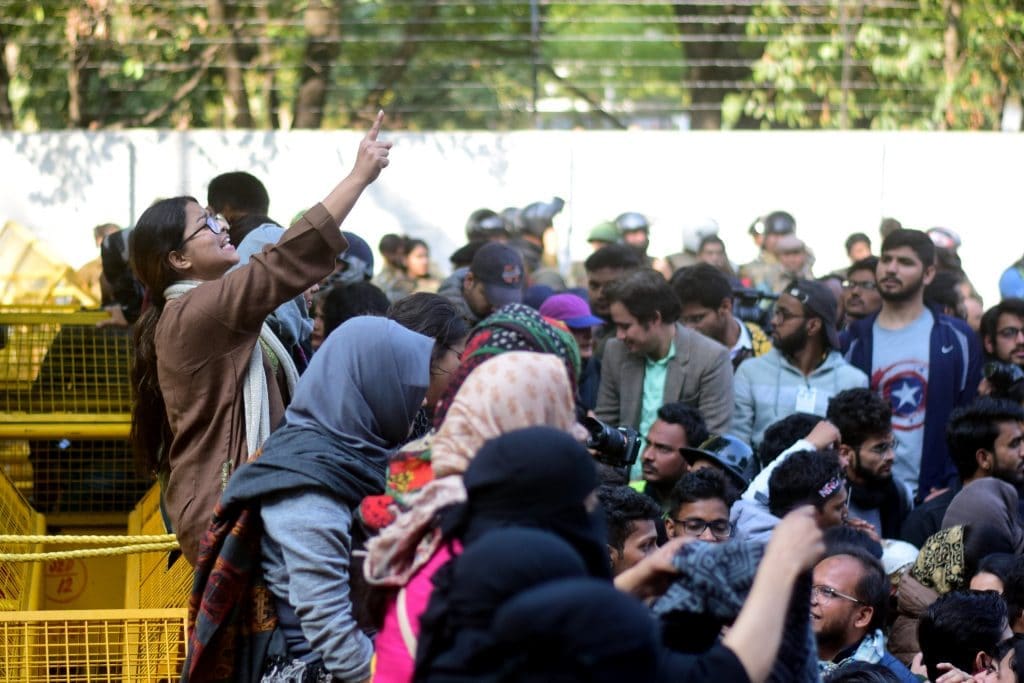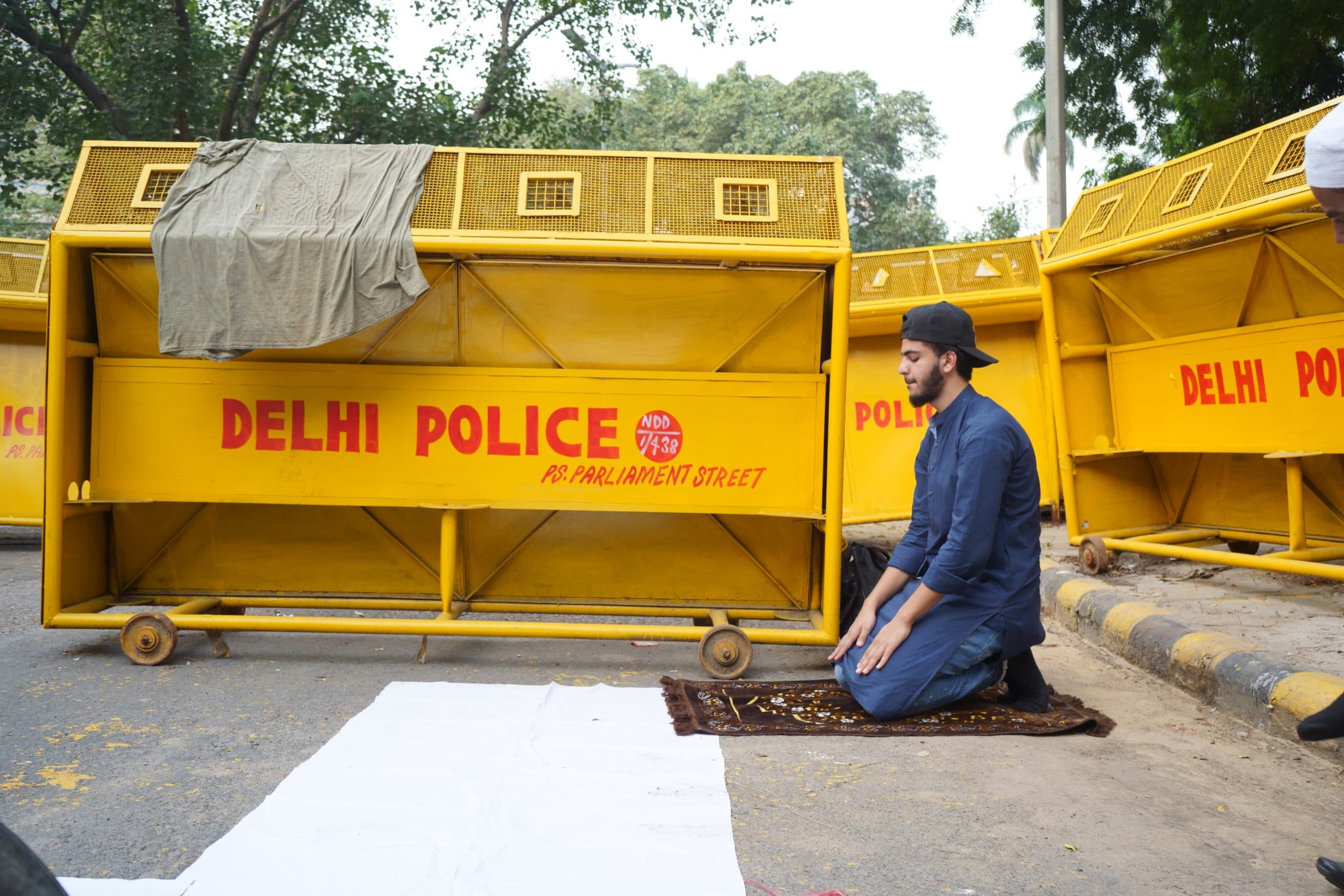
Over 150 students of Azim Premji University in Bengaluru, demanded the immediate release of student activists across the country who were arrested following the protests against the Citizenship Amendment Act and called for an end to the politics of vendetta against protesters and political dissenters.
“We, a collective of 150 students of Azim Premji University, hereby register our strong protest at the continued harassment and criminalisation of our fellow students in other universities for political dissent. We are appalled by the way student activists in universities across Delhi and Uttar Pradesh, especially Jamia Milia Islamia (JMI), Aligarh Muslim University (AMU) and Delhi University (DU), have been targeted for protesting the sectarian and anti-secular Citizenship Amendment Act (CAA),” students said in a joint statement.
Delhi Police accused Jamia Millia research scholar and leader of Jamia Coordination Committee Safoora Zargar, research scholar and RJD activist Meeran Haider, Gulshifa, an MBA student and a coordinator of the women-led sit-in in Seelampur-Jafrabad against CAA and other Muslim students and rights activists of being the key “conspirators” in the Delhi pogrom that erupted in 2020 February. They all were arrested under draconian UAPA.
“The targeting of Muslim students is connected to Islamophobia, which is deeply embedded in our ruling party’s Hindutva ideology. Muslims – both political dissenters and common citizens – have been targets for the government and the police,” they wrote in the statement.
“While police investigation into the violence is welcome, it’s character and direction raise concern and suspicions,” the students said.
The Delhi pogrom is widely acknowledged to have been sparked by incendiary comments made by Kapil Mishra, a BJP leader, about Muslims peacefully protesting against ‘anti-Muslim and unconstitutional’ citizenship law.
Students demanded a fair investigation into the Delhi pogrom and the rehabilitation of its victims.
” The use of the Covid-19 lockdown to launch the crackdown, besides defying the rationale behind the lockdown, is inhuman: the prisons are unsafe for health reasons and the families of many of the protesters are in any case struggling to make do under the pandemic crisis,” the statement reads.
Azim Premji University students said that the police action is part of a war on students “who dare to dissent politically against the ruling government.”
“Aligarh Muslim University and Jamia Millia Islamia were ransacked by the police and CRPF earlier in the year while Jawaharlal Nehru University students were brutally attacked by a self-proclaimed Hindutva outfit in the wake of the anti-fee hike protests in January,” it added.
The students also urged their fellow citizens to “demand a governance that is secular and democratic; one that prioritizes the task of guaranteeing the basic rights of all citizens, especially that of the working classes, Dalits, Adivasis and others who are on the wrong side of our deeply unequal society.”
Read the unedited full text of the statement:
We, a collective of 150 students of Azim Premji University, hereby register our strong protest at the continued harassment and criminalisation of our fellow students in other universities for political dissent. We are appalled by the way student activists in universities across Delhi and Uttar Pradesh, especially Jamia Milia Islamia (JMI), Aligarh Muslim University (AMU) and Delhi University (DU), have been targeted for protesting the sectarian and anti-secular Citizenship Amendment Act (CAA). Safoora Zargar and Meeran Haider (both from JMI) as well as Gulfisha–a recent MBA graduate and community organiser from Jaffrabad – have been arrested and slapped with the draconian Unlawful Activities Prevention Act (UAPA). Media reports that Delhi Police has seized the phones of All India Student Association (AISA) activist Kawalpreet Kaur and of a few activists belonging to the women’s group called Pinjra Tod.
The arrests have been justified by the police as a necessary step towards identifying the forces behind the anti-Muslim pogrom that unfolded in North East Delhi in the wake of the peaceful and democratic anti-CAA protests. In the last few days, even Shifa-ur-Rahman, Jamia Alumni Association President, and Zafarul Khan, Chairman of the Delhi Minorities Commission, have been slapped with sedition charges. While police investigation into the violence is welcome, it’s character and direction raise concern and suspicions. There is ample video evidence in the public domain of the Bharatiya Janata Party (BJP) leader Kapil Mishra threatening to take the law into his own hands a few days prior to the outbreak of violence. Despite that, the police seem intent on investigating the protesters alone. The use of the Covid-19 lockdown to launch the crackdown, besides defying the rationale behind the lockdown, is inhuman: the prisons are unsafe for health reasons and the families of many of the protesters are in any case struggling to make do under the pandemic crisis.


While the anti-CAA protests form the immediate contexts of the police action, this is part of a war on students who dare to dissent politically against the ruling government. In recent times, publicly funded universities such as AMU, JMI and DU, alongside Jawaharlal Nehru University (JNU), Hyderabad Central University (HCU), Punjab University (PU), Cotton College (Guwahati) – to name a few – have been the hotbeds of resentment against lopsided government policies: controversial legislations such as the CAA, divisive measures such as the National Register of Citizens (NRC), the unilateral revocation of Article 370 and the siege of Kashmir, fee hikes in public universities and large scale privatisation of higher education, and others. In retaliation, both AMU and JMI were ransacked by the police and CRPF earlier in the year while JNU students were brutally attacked by a self-proclaimed Hindutva outfit in the wake of the anti-fee hike protests in January.
The targeting of university students is connected to the politics of education that the current government practices. Determined to increase Hindutva influence over higher education, the government treats student political dissenters as nuisance and disdains democratic cultures in universities. The current attack on student dissent is coming at a time when the student community faces an uncertain future due to job losses because of the Covid-19 lockdown as well as due to the discriminatory nature of the lockdown-induced online mode of teaching. Many students with poor internet connections, and those facing difficulties at home, are struggling to complete their courses in the online mode
The targeting of Muslim students is connected to Islamophobia, which is deeply embedded in our ruling party’s Hindutva ideology. Muslims – both political dissenters and common citizens – have been targets for the government and the police. That explains the booking of Srinagar based photojournalist Masrat Zahra under UAPA, the detention of Chingiz Khan – the Manipuri scholar from JNU – for calling out the government’s discrimination against Muslims, the witch-hunting of Sharjeel Imam for his outspoken criticism of the CAA/NRC, the arrest of Amir Mintoee – a student activist from AMU – not to mention the endless harassment of common Muslim citizens all over India, especially in Uttar Pradesh – in the wake of the anti-CAA protests.
With the country in turmoil, and under the rule of a government which seems to care little for common people, democratic spaces and cultures of dissent are the needs of the hour. It is unfortunate that the government has prioritized crushing dissent in all forms – of students as well as of democratic organisations, movements and activists – over addressing the burning questions of universal public health care, securing the livelihoods and workplace rights of workers, and proactively addressing the gaping inequality between the “balcony classes” and the working classes. Throughout the Covid-19 pandemic, the government has done little to meet the needs of the working classes and the poor and instead, with the help of its allies in the media, have misled the public by sensationalizing the unfortunate events at the Tablighi Jamaat gathering.
Indian universities and students are inheritors of a rich democratic tradition of student movements that have spoken truth to power. Let the Covid-19 masks not shut our voices. We reiterate our rejection of the CAA and NRC and demand the immediate withdrawal of all fabricated cases against the anti-CAA protestors and other democratic activists as well as the repeal of draconian and anti-democratic laws like the UAPA which assumes the accused guilty until proven innocent. We also condemn the siege of Kashmir and brutality on university campuses. We reject hate mongering and Islamophobia and stand by our constitutional values including that of secularism. We demand a fair investigation into the Delhi pogrom and the rehabilitation of its victims. We extend our solidarity to all students and other democratic forces who are organising steadily against the lop-sided priorities of the government and urge other students to do the same. We urge our fellow citizens to demand a governance that is secular and democratic; one that prioritizes the task of guaranteeing the basic rights of all citizens, especially that of the working classes, Dalits, Adivasis and others who are on the wrong side of our deeply unequal society.



